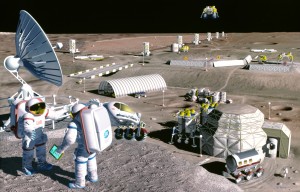If You Could, Would You Live On Another Planet?
 People have always been fascinated by the Universe; Archaeological finds demonstrate that as early as 5000 years ago, people already tried to analyze and interpret the movement of celestial bodies; ancient civilizations of Mesopotamia, Egypt, India, Central America, China, and Greece built first prototypes of astronomical observatories. Nowadays, thanks to impressive technological and scientific advances, it is becoming more and more plausible to imagine people being able to live on some other than the Earth planet.
People have always been fascinated by the Universe; Archaeological finds demonstrate that as early as 5000 years ago, people already tried to analyze and interpret the movement of celestial bodies; ancient civilizations of Mesopotamia, Egypt, India, Central America, China, and Greece built first prototypes of astronomical observatories. Nowadays, thanks to impressive technological and scientific advances, it is becoming more and more plausible to imagine people being able to live on some other than the Earth planet.
As it is well-known, first space mission occurred on April 12, 1961 when a Soviet astronaut Yuri Gagarin traveled into orbital space for one hundred and eight minutes in his space ship Vostok 1. Soon thereafter, an American astronaut Alan Shepard went into space on May 5, 1961; and John Glenn was the first American to go into orbit around the Earth on February 20, 1962. Moreover, twelve people, including Neil Armstrong and Buzz Aldrin in 1969, have landed on Moon. Currently, many countries have space stations and space programs and the NASA had recently announced that it plans to develop a space capsule which will allow four astronauts to travel into deep space locations such as Mars, Moon, and different asteroids by 2016.
 Moreover, in recent years a new phenomenon called “space tourism” or “citizen space exploration” has taken place. While very few people were able to take advantage of it due to its really astronomical price which goes anywhere from twenty to forty million dollars per person, people still seem to be intrigued by the possibility of living on some other planet in the future. Of course, there are numerous variables to consider: gravity, radiation levels, temperature, and the availability of life-sustaining recourses such as water. So far, NASA scientists reported the discovery of some Earth-like planets in the habitable orbit of sun-like stars which are not too cold or hot for water (essential factor for possible life). And, quite frankly, it does seem plausible that in an infinite universe there might be at least one planet capable of sustaining life besides the Earth.
Moreover, in recent years a new phenomenon called “space tourism” or “citizen space exploration” has taken place. While very few people were able to take advantage of it due to its really astronomical price which goes anywhere from twenty to forty million dollars per person, people still seem to be intrigued by the possibility of living on some other planet in the future. Of course, there are numerous variables to consider: gravity, radiation levels, temperature, and the availability of life-sustaining recourses such as water. So far, NASA scientists reported the discovery of some Earth-like planets in the habitable orbit of sun-like stars which are not too cold or hot for water (essential factor for possible life). And, quite frankly, it does seem plausible that in an infinite universe there might be at least one planet capable of sustaining life besides the Earth.
As such, a hypothetical question arises—if some planet which potentially could sustain humans was discovered, would there be people willing to leave the Earth and start a new life there?
Of course, first and foremost it is a question of personal choice and available technologies. After all, there are always people who like the unknown and our technological progress is truly astounding. Many things which seemed like something out of sci-fi books and movies are becoming a reality; and it is not so far-fetched to imagine that someday people will be able to develop technologies which would allow us to live on another planet. Also, there is another, much more gruesome, possibility that people will simply be unable to continue living on Earth due to some catastrophe such as ecological, nuclear, being hit by an asteroid, or overpopulation. While it is difficult to consider such awful scenarios, it is still better to be somehow prepared for them. Consequently, it is crucial that further exploration of space continues. – Becky Kospanova
who like the unknown and our technological progress is truly astounding. Many things which seemed like something out of sci-fi books and movies are becoming a reality; and it is not so far-fetched to imagine that someday people will be able to develop technologies which would allow us to live on another planet. Also, there is another, much more gruesome, possibility that people will simply be unable to continue living on Earth due to some catastrophe such as ecological, nuclear, being hit by an asteroid, or overpopulation. While it is difficult to consider such awful scenarios, it is still better to be somehow prepared for them. Consequently, it is crucial that further exploration of space continues. – Becky Kospanova

